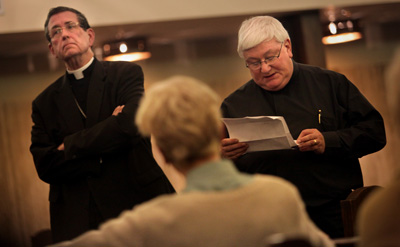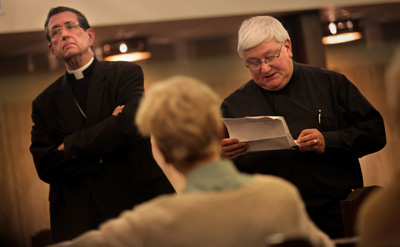
(RNS2-DEC07) Bishop Richard Lennon of Cleveland listens as the Rev. Paul Rosing reads a court injunction prohibiting protesters from occupying St. John the Baptist Church in Akron hours before the church’s final Mass. For use with RNS-LENNON-PROFILE, transmitted Dec. 7, 2010. RNS photo by Gus Chan/The Plain Dealer.

(RNS2-DEC07) Bishop Richard Lennon of Cleveland listens as the Rev. Paul Rosing reads a court injunction prohibiting protesters from occupying St. John the Baptist Church in Akron hours before the church’s final Mass. For use with RNS-LENNON-PROFILE, transmitted Dec. 7, 2010. RNS photo by Gus Chan/The Plain Dealer.
CLEVELAND (RNS) Even before he was officially installed as the Roman Catholic bishop of Cleveland in 2006, Richard G. Lennon was already talking about the need to close churches.
“As painful as a funeral is, it’s there that you commend your loved one to God,” Lennon told reporters just weeks before his installation.
Those words, coming from an auxiliary bishop who had just closed scores of churches in Boston, sounded a death knell for dozens more in Northeast Ohio — and unleashed a small but shrill backlash across Lennon’s new flock.
The extensive downsizing is essentially over, although some of the closings remain under appeal with the Vatican. In the end, 50 parishes were closed. Vacant churches are up for sale, merged parishes are moving forward.
Now, Lennon must minister to a diocese where emotions remain raw.
Like many U.S. bishops in financially struggling regions, Lennon faced a rapidly changing church: too few priests and too few members for too many buildings.
Week after week, the bishop presided over the parish closings. Lennon’s defenders say his swift and sweeping approach was needed, because it was glaringly apparent when he arrived that decades of Catholic flight to the suburbs had left near-empty churches in the city with little money to operate.
And with few men entering the priesthood, his defenders argue, the bishop needed to consolidate urban parishes, allowing him to reassign some of his shrinking corps of clergy to growth areas.
“He had to look at the whole diocese, not just a few parishes,” said the Rev. John Betters, pastor of Saints Robert and William Catholic Church in Euclid, a newly merged parish. “He came into a situation of having too many parishes for the number of Catholics. I certainly wouldn’t want to be in his shoes because he had to make some very tough calls.”
Making those calls would require an imposing, authoritarian figure to quell any rebellion. And Lennon — who’s been called a “meat cleaver” by one local Methodist minister — seemed like just the man.
Standing 6-foot-2 with a booming Boston accent, the 63-year-old bishop could be an intimidating presence when delivering a parish’s last rites. Nicknamed “The Boston Strangler” by detractors, he sometimes arrived at a final Mass escorted by uniformed and plainclothes police.
Protesters, who called it the “Mass of Eviction,” once circled his car as his driver edged the vehicle out of the parking lot. At one closing, parishioners called him “Judas” and a man in his 90s pulled the plug on the bishop’s microphone.
“He showed little compassion,” said Patricia Schulte-Singleton, one of a few dozen protesters who followed Lennon from church to church. “And he wanted to let everybody know that he was in charge.”
Lennon himself has said little publicly about the closings since announcing the downsizing plan in March of 2009. But Betters said the bishop “is really getting a very bad rap.”
“He has listened very carefully to the people,” said Betters. “He didn’t always agree with them, but he patiently listened.”
Those close to Lennon, both in Cleveland and in Boston, described him as a man who lives a no-frills, simple life in the rectory of St. John’s Cathedral in downtown Cleveland.
“I find him to be a sensitive, good, holy man,” said Betters.
But that’s a tough sell for Marilyn Madigan from the closed St. Patrick’s Church, who said she will never forget how Lennon treated her and other parishioners during a meeting in his office.
When Madigan told the bishop she had followed the advice of her pastor regarding procedures for appealing the parish’s closing, Lennon “pounded his fist on the table,” she said, “pointed his finger at me and said, `I’m your leader. You listen to me.”‘
Patrick Auletta, a board member of the diocese’s fundraising arm, said he admired Lennon for taking on what he knew would be an enormously unpopular task. He said the bishop told him he had been spat upon and sworn at.
“He realizes the job he has to do has a lot of unpleasantries,” said Auletta. “He’s not the kind of guy to kick the can down the road and leave it for someone else.”
Back in Boston, anger and pain continue to seethe six years after Lennon closed parishes there, including his boyhood church built by his working-class ancestors.
Eventually, the 83 closings were reduced to 60, but nine congregations in the archdiocese refused to leave and started around-the-clock vigils. In 2005, the archdiocese reopened four of the nine occupied churches. Today, five remain under occupation.
“The guy’s brutal. He’s arrogant and condescending,” said parishioner Jon Rogers, who continues to occupy a shuttered seaside church in Scituate, Mass. “My condolences to the fine people in Cleveland. He’s your problem now, not ours.”
(BEGIN OPTIONAL TRIM)
Lennon grew up in Arlington, Mass., in an Irish Catholic family that prayed the rosary daily and attended Mass every Sunday. He was quiet and studious, embarrassed by a stutter that he would eventually overcome in seminary.
Lennon was ordained in 1973 and served in parishes in the Boston archdiocese. In 1988, Boston’s Cardinal Bernard Law moved Lennon into the chancery as chief canon law expert. In 1999, Law appointed him rector of St. John’s Seminary, and Pope John Paul II named him an auxiliary bishop in 2001.
And when Law, embroiled in the clerical sex-abuse crisis, resigned in disgrace in 2002, the pope named Lennon as the interim head of the archdiocese.
“Lennon’s willpower, analytical bent and capacity for hard work have helped him surpass colleagues of greater charisma or careerism and build a reputation as a man who presses past obstacles where others might stop,” The Boston Globe wrote at the time.
(END OPTIONAL TRIM)
During the Cleveland closings, a few dozen protesters tried to save some of the churches through petitions, appeals and pickets.
One congregation, St. Peter’s in downtown Cleveland, broke away from the diocese and has been worshipping in rented commercial space, defying the bishop and church law.
Lennon, at times, was received with respect when he showed up to say last Masses. But often, like when he arrived at Sacred Heart of Jesus Hungarian Catholic Church in Akron, he found himself engulfed by shouts of anger and ridicule.
“Do you really believe I like doing this?” Lennon asks in a video of the confrontation that is now posted on YouTube. The crowd responds, “Yes!”
“What joy does it bring me?” he asks. The crowd shouts, “Money!”
“Please,” Lennon says. “I don’t get anything.”
The bishop continues: “I certainly understand people who are very sad and people who are very angry. I am not without sensitivity.”
The crowd laughs, prompting Lennon to hold up his hands. “You may laugh as you wish.
“I did something that none of you have done,” he continued. “I closed my own parish. Because as a man of God I believe it was the right thing to do for the mission that Jesus Christ has given us.”
(Michael O’Malley writes for The Plain Dealer in Cleveland.)




